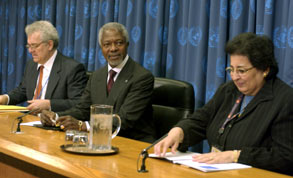Press Release
Far Too Many Women Risking Death to Give Life, UNFPA Leader Says, As UN Unveils Progress Report on Development Goals
09 June 2005
Press Release
09 June 2005
UNITED NATIONS, New York—A world in which a woman risks death each minute in order to bring new life must be transformed, Thoraya Ahmed Obaid, the Executive Director of UNFPA, the United Nations Population Fund, said today.

"We must create a better, more caring world by doing all we can to prevent millions of our less fortunate sisters from losing their lives to pregnancy and childbirth, especially when we know how to avoid these tragic deaths," said Ms. Obaid during the launching of a report on the progress and challenges in attaining the Millennium Development Goals (MDGs) agreed by the world's leaders in 2000. "Countries have long agreed that no woman should be left to die for lack of reproductive health, and today’s report reaffirms that universal access to reproductive health care, including family planning, is the starting point for maternal health and saving women's lives."
"Maternal health also frees women to pursue opportunities in work and education, giving them power to make decisions to improve lives in their families and communities," said Ms. Obaid. "The empowerment of women, as today's report affirms, is prerequisite to overcoming poverty, hunger and disease, and to achieving all development goals."
"Despite some progress over the last five years, today's report clearly shows that we must do far more to reduce poverty and save lives around the world," said Ms. Obaid. "Promoting the rights of girls and women, securing their reproductive health and the means to protect themselves from sexually transmitted infections, particularly HIV/AIDS, are the surest ways to realize the development goals of all countries, rich or poor."
The Millennium Development Goals Report 2005, Ms. Obaid said, fully underlines the important links between the MDGs and the Programme of Action of the 1994 Cairo International Conference on Population and Development, which stresses the role of reproductive health in sustaining lives and fighting poverty.
The lifetime risk of death from pregnancy in the developing world would be reduced substantially if all of its women had access to the family planning services they desired, according to the report. Currently, it adds, 200 million women have an unmet need for safe and effective contraceptive services.
If these women used effective contraception, more than 100,000 maternal deaths—one fifth of world totals—could be avoided each year, according to the World Health Organization.
Today's report says that it is essential for pregnant women who face unexpected complications to get medical care and access to emergency obstetric care centres that must be stocked with drugs, equipment and supplies.
The Millennium Development Goals Report 2005 also calls for pragmatic and forward-looking approaches to prevent the spread of HIV/AIDS. "Because there is no cure for AIDS, prevention is essential", it states, adding "treatment and care need to be expanded to reach millions more," who are HIV-positive.
***
UNFPA is the world's largest multilateral source of population assistance. Making motherhood safer for all women is at the heart of the Fund's mandate.
Contact Information:
Abubakar Dungus
Tel.: +1 (212) 297-5031
Email: dungus@unfpa.org
Omar Gharzeddine
Tel.: +1 (212) 297-5028
Email: gharzeddine@unfpa.org